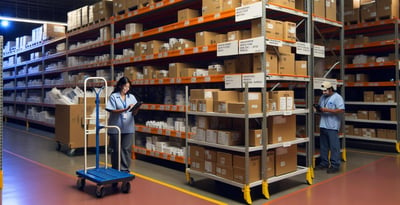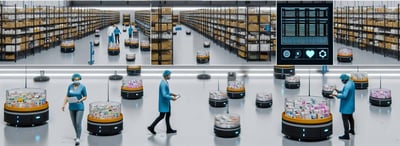AI-Optimized Inventory Replenishment
Production schedulers are tasked with the challenging responsibility of ensuring that medical products are manufactured efficiently and delivered on time to meet the ever-increasing demand. One of the critical aspects of this process is managing inventory effectively, which directly impacts production schedules and overall operational efficiency.
In this blog, we will look into the world of AI-optimized inventory replenishment and its integration with advanced software systems like PlanetTogether and major ERP, SCM, and MES systems such as SAP, Oracle, Microsoft, Kinaxis, Aveva, and others.

Inventory Management in Medical Manufacturing
Before we explore AI-optimized inventory replenishment, let's first understand the unique challenges faced by production schedulers in medical manufacturing facilities:
Regulatory Compliance: The medical industry is heavily regulated, and maintaining compliance with various standards and regulations (e.g., FDA, ISO) is paramount. This adds complexity to inventory management, as precise tracking and documentation of materials are required.
Variability in Demand: Medical manufacturing facilities often experience fluctuations in demand due to factors like seasonality, new product launches, or unexpected events (e.g., a pandemic). Managing inventory levels that can adapt to these changes is essential.
High Cost of Stockouts and Overstock: Stockouts can lead to delayed production and missed opportunities, while overstocking ties up capital and valuable warehouse space. Striking the right balance is a constant challenge.
Diverse Product Portfolios: Medical manufacturers often produce a wide range of products with different characteristics and shelf-life requirements. Managing multiple SKUs efficiently is complex.
Supply Chain Disruptions: The global supply chain can be prone to disruptions, as seen during the COVID-19 pandemic. Managing inventory effectively requires flexibility to adapt to these disruptions.

AI-Optimized Inventory Replenishment
Artificial Intelligence (AI) has revolutionized inventory management in the medical manufacturing sector. AI-driven algorithms can analyze vast datasets, predict future demand, and recommend optimal replenishment strategies. Here's how AI can address the challenges mentioned above:
Regulatory Compliance: AI systems can maintain accurate records and documentation, ensuring that materials are tracked and managed according to regulatory requirements.
Demand Forecasting: AI algorithms can analyze historical sales data, market trends, and external factors to provide accurate demand forecasts, helping production schedulers plan their inventory more effectively.
Inventory Optimization: AI can optimize inventory levels, taking into account factors like lead times, shelf-life, and supply chain disruptions. This ensures that stockouts and overstock situations are minimized.
SKU Management: AI can help categorize products based on their characteristics and requirements, allowing for efficient SKU management and streamlined replenishment strategies.
Adaptability to Supply Chain Disruptions: AI-powered systems can quickly adapt to supply chain disruptions by analyzing real-time data and adjusting inventory levels and production schedules accordingly.


Integration with PlanetTogether and Major ERP, SCM, and MES Systems
To fully leverage the power of AI-optimized inventory replenishment, it's crucial to integrate such systems with existing software solutions like PlanetTogether and major ERP, SCM, and MES systems. Here's how this integration can enhance efficiency and effectiveness:
Seamless Data Flow: Integration allows for the seamless flow of data between different systems. AI-powered inventory management solutions can access real-time data from PlanetTogether, ERP systems (e.g., SAP, Oracle, Microsoft), SCM systems (e.g., Kinaxis), and MES systems (e.g., Aveva). This ensures that the inventory decisions are based on the most up-to-date information.
Improved Decision-Making: AI algorithms rely on accurate data to make informed decisions. Integration with existing systems ensures that all relevant data, including production schedules, purchase orders, and sales forecasts, is readily available for analysis.
Automation of Replenishment Orders: With integration in place, AI-optimized inventory management systems can automatically generate replenishment orders, taking into account production schedules and demand forecasts. This reduces the manual workload for production schedulers and minimizes the risk of human errors.
Real-time Visibility: Production schedulers can gain real-time visibility into inventory levels, order status, and potential issues through integrated dashboards. This empowers them to make proactive decisions and respond quickly to changing conditions.
Scalability and Flexibility: Integration with major software systems ensures that the AI-powered solution can scale with the growing needs of the medical manufacturing facility. It also offers the flexibility to adapt to changes in production processes or business strategies.
Implementation Considerations
Before implementing AI-optimized inventory replenishment and integration with existing systems, production schedulers in medical manufacturing facilities should consider the following key points:
Data Quality: Ensure that the data within the integrated systems is accurate and up-to-date. AI relies heavily on data quality for accurate decision-making.
Collaboration: Foster collaboration between IT teams, production scheduling teams, and vendors to ensure a smooth integration process.
Training: Provide training to staff on how to use the integrated solution effectively and interpret AI-generated recommendations.
Scalability: Choose an AI solution that can grow with your business and adapt to evolving needs.
Monitoring and Evaluation: Continuously monitor the performance of the integrated system and make adjustments as necessary to optimize results.
AI-optimized inventory replenishment is the future of efficiency in medical manufacturing. By harnessing the power of artificial intelligence and integrating it with existing systems like PlanetTogether and major ERP, SCM, and MES systems, production schedulers can streamline their operations, reduce costs, improve compliance, and enhance overall customer satisfaction.
In a highly competitive and regulated industry like medical manufacturing, staying ahead of the curve is not just a matter of choice; it's a necessity. Embracing AI-optimized inventory replenishment and integration is the key to achieving operational excellence and ensuring the success of your medical manufacturing facility in the years to come.
Are you ready to take your manufacturing operations to the next level? Contact us today to learn more about how PlanetTogether can help you achieve your goals and drive success in your industry.


